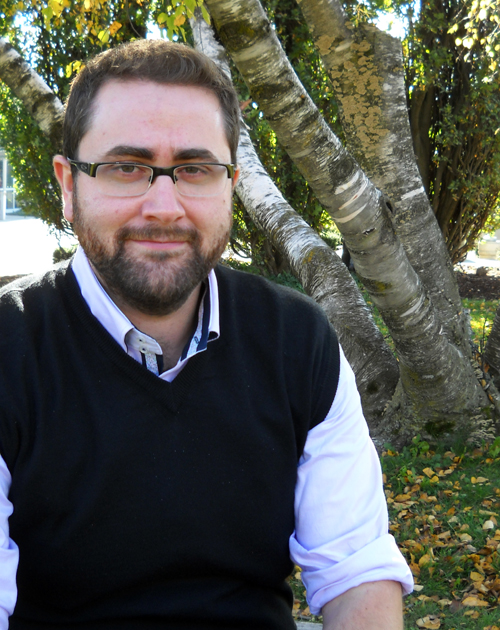
Most birds are heading south now, but this bird researcher flew north to Guelph this fall.
Pathobiology professor Leonardo Susta studies avian diseases that threaten economic and human health. Originally from Italy, he arrived at U of G in early October from Georgia, where he completed a doctorate and spent the past two years working on Newcastle disease virus (NDV) in poultry.
Besides continuing work here on NDV, he expects to look at other diseases whose human health impacts have captured headlines in recent years, including bird flu and salmonella.
The most recent NDV outbreak in North America — in California in 2002 — caused about $60-million worth of losses to poultry producers and related sectors. “It definitely has a toll on the economy,” says Susta.
Newcastle disease virus affects both developed and developing nations in different ways.
In a developed country like Canada, an epidemic would pose mostly an economic threat. That’s because other nations would close their doors to poultry exports from Canadian producers, he says, adding that the disease is not considered an immediate threat here.
In developing nations, small flock owners rely on poultry for food and part of their livelihood. As birds with Newcastle disease lay fewer eggs, farmers lose food as well as income.
Working at the cellular level, Susta studies resistance to the virus that causes the disease. He also plans to devise better vaccines to control NDV. Although pertinent vaccines have been around for decades, they are not foolproof. “The Newcastle disease virus changes constantly, so new measures to improve vaccines are needed,” he says.
In Georgia, he developed recombinant viruses that express chicken cytokines, which are molecules that boost the immune system. He’ll use that experience here, working to develop better vaccines to control outbreaks.
He will study both commercial and non-commercial poultry flocks such as those allowed in Guelph and other municipalities.
Poultry can pick up Newcastle disease from wild birds. Susta says flock owners need to exercise strict biosecurity measures, including keeping birds in well-built pens and houses that prevent contact with wildfowl and other wild birds.
Through the Animal Health Laboratory (AHL) in his building, he has access to diseased birds arriving from farms or homeowners around Guelph. He plans to work with local flock owners as well as birds housed at U of G’s Arkell Research Station.
Other Guelph experts studying infectious diseases in poultry include pathobiology professors Eva Nagy and Shayan Sharif as well as experts at the AHL and the Ontario Ministry of Agriculture and Food.
Susta expects to look at other diseases in birds, including avian influenza, salmonella and infectious laryngeotracheitis, a viral respiratory affliction in poultry.
He completed his PhD at the University of Georgia with Corrie Brown, a veterinary pathologist and Guelph DVM graduate. He then worked at the Southeast Poultry Research Laboratory run by the United States Department of Agriculture (USDA) in Athens, Georgia.
Susta did his own veterinary studies in Perugia, Italy. He hadn’t planned on studying avian diseases but was drawn into the field while working with Brown. “You have to be ready to grasp opportunities,” he says.
More promising chances for research – and research funding – were what brought him to North America.
“I was drawn more toward research and infectious diseases as a vet student. I always liked basic sciences. Infectious diseases and pathology are translational disciplines linking the knowhow and experience of everyday veterinary practice with basic science.”
Having spent a couple of years working with the USDA, he wanted to return to academia. Partly he was missing the teaching contact with students. Also, he says a university allows him to pursue a wider range of research topics than a more focused government research lab.
When he arrived in Guelph this past March for interviews, there was still snow on the ground. “That was a bit of a shock, so I hope to survive the winter.”
So far, he has explored Guelph Lake and the Elora Gorge as well as Toronto’s distillery district.
“Guelph has a lot of diversity, more than the U.S. I have a feeling the U.S. is more a melting pot. In Canada, people maintain their diversity.”
So far, he’s found everything he needs in his new home — well, almost everything. He’s awaiting the next shipment of olive oil from his mother back in Italy. “I guess it doesn’t get any more stereotypical than that.”
And he plans to find a new indoor pet bird, maybe to replace the African grey parrot he acquired as a vet student and left behind with Mom when he came to North America.